
Go away, there's nothing for you here. I ship Duo and Relena and you'll pry my rarepair from my cold dead hands.
259 posts
Latest Posts by goneau2xr - Page 7
Zechs: Let’s give humanity a war so horrible that it’ll scare everyone out of future wars! Oh, and let’s destroy the Earth in the process!
Relena:

Dorothy: Here’s a fun Christmas idea. We’ll hang mistletoe, but instead of kissing, you have to FIGHT whoever else is under it.
Relena: We are not doing that.
Dorothy: Mistlefoe™
Relena: Dorothy NO.
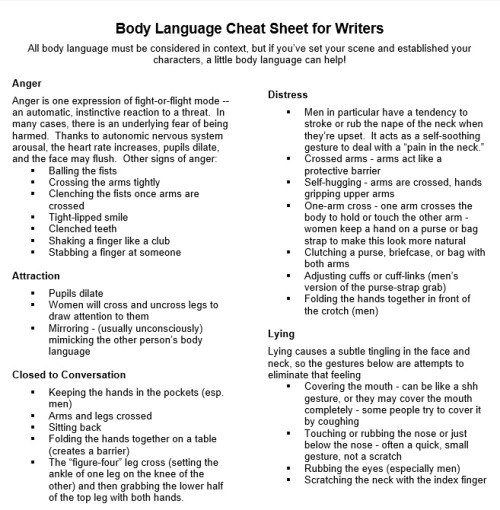

Body Language Cheat Sheet for Writers
As described by Selnick’s article:
Author and doctor of clinical psychology Carolyn Kaufman has released a one-page body language cheat sheet of psychological “tells” (PDF link) fiction writers can use to dress their characters.
A Crack Shot: On writing characters who shoot
Or: How to Write Your Gun-Toting Badass In a Way That Doesn’t Strain Your Reader’s Suspension of Disbelief
Today I read a fic in which a character visited 1) a 2000-yard shooting range 2) with a handgun, and I had to just stop and stare into the distance while considering whether I could ignore it enough to continue. Being me, I decided to make this writing guide instead. I have attempted to write this so zero familiarity with guns beyond what you may have seen on TV/in movies is required.
So you’ve taken your character to the shooting range to establish their credibility…
Keep reading
Helpful things for action writers to remember
Sticking a landing will royally fuck up your joints and possibly shatter your ankles, depending on how high you’re jumping/falling from. There’s a very good reason free-runners dive and roll.
Hand-to-hand fights usually only last a matter of seconds, sometimes a few minutes. It’s exhausting work and unless you have a lot of training and history with hand-to-hand combat, you’re going to tire out really fast.
Arrows are very effective and you can’t just yank them out without doing a lot of damage. Most of the time the head of the arrow will break off inside the body if you try pulling it out, and arrows are built to pierce deep. An arrow wound demands medical attention.
Throwing your opponent across the room is really not all that smart. You’re giving them the chance to get up and run away. Unless you’re trying to put distance between you so you can shoot them or something, don’t throw them.
Everyone has something called a “flinch response” when they fight. This is pretty much the brain’s way of telling you “get the fuck out of here or we’re gonna die.” Experienced fighters have trained to suppress this. Think about how long your character has been fighting. A character in a fist fight for the first time is going to take a few hits before their survival instinct kicks in and they start hitting back. A character in a fist fight for the eighth time that week is going to respond a little differently.
ADRENALINE WORKS AGAINST YOU WHEN YOU FIGHT. THIS IS IMPORTANT. A lot of times people think that adrenaline will kick in and give you some badass fighting skills, but it’s actually the opposite. Adrenaline is what tires you out in a battle and it also affects the fighter’s efficacy - meaning it makes them shaky and inaccurate, and overall they lose about 60% of their fighting skill because their brain is focusing on not dying. Adrenaline keeps you alive, it doesn’t give you the skill to pull off a perfect roundhouse kick to the opponent’s face.
Swords WILL bend or break if you hit something hard enough. They also dull easily and take a lot of maintenance. In reality, someone who fights with a sword would have to have to repair or replace it constantly.
Fights get messy. There’s blood and sweat everywhere, and that will make it hard to hold your weapon or get a good grip on someone.
A serious battle also smells horrible. There’s lots of sweat, but also the smell of urine and feces. After someone dies, their bowels and bladder empty. There might also be some questionable things on the ground which can be very psychologically traumatizing. Remember to think about all of the character’s senses when they’re in a fight. Everything WILL affect them in some way.
If your sword is sharpened down to a fine edge, the rest of the blade can’t go through the cut you make. You’ll just end up putting a tiny, shallow scratch in the surface of whatever you strike, and you could probably break your sword.
ARCHERS ARE STRONG TOO. Have you ever drawn a bow? It takes a lot of strength, especially when you’re shooting a bow with a higher draw weight. Draw weight basically means “the amount of force you have to use to pull this sucker back enough to fire it.” To give you an idea of how that works, here’s a helpful link to tell you about finding bow sizes and draw weights for your characters. (CLICK ME)
If an archer has to use a bow they’re not used to, it will probably throw them off a little until they’ve done a few practice shots with it and figured out its draw weight and stability.
People bleed. If they get punched in the face, they’ll probably get a bloody nose. If they get stabbed or cut somehow, they’ll bleed accordingly. And if they’ve been fighting for a while, they’ve got a LOT of blood rushing around to provide them with oxygen. They’re going to bleed a lot.
Here’s a link to a chart to show you how much blood a person can lose without dying. (CLICK ME)
If you want a more in-depth medical chart, try this one. (CLICK ME)
Hopefully this helps someone out there. If you reblog, feel free to add more tips for writers or correct anything I’ve gotten wrong here.
Synonyms For Very
This masterlist is a masterlist of words that you may use alongside the word very, very being one of the most common words that are used when writing. I hope this helps you as much as it helps me in our writing seem more sophisticated and unique.
A:
Very accurate - exact Very afraid - fearful Very angry - furious Very annoying - exasperating
B:
Very bad - atrocious Very beautiful - exquisite Very big - immense Very boring - dull Very bright - luminous Very busy - swamped
C:
Very calm - serene Very careful - cautious Very cheap - stingy Very clean - spotless Very clear - obvious Very clever - intelligent Very cold - freezing Very colourful - vibrant Very competitive - cutthroat Very complete - comprehensive Very confused - perplexed Very conventional - conservative Very creative - innovative Very crowded - bustling Very cute - adorable
D:
Very dangerous - perilous Very dear - cherished Very deep - profound Very depressed - despondent Very detailed - meticulous Very different - disparate Very difficult - arduous Very dirty - filthy Very dry - arid Very dull - tedious
E:
Very eager - keen Very easy - effortless Very empty - desolate Very excited - thrilled Very exciting - exhilarating Very expensive - costly
F:
Very fancy - lavish Very fast - swift Very fat - obese Very friendly - amiable Very frightened - alarmed Very frightening - terrifying Very funny - hilarious
G:
Very glad - overjoyed Very good - excellent Very great - terrific
H:
Very happy - ecstatic Very hard - difficult Very hard-to-find - rare Very heavy - leaden Very high - soaring Very hot - sweltering Very huge - colossal Very hungry - ravenous Very hurt - battered
I:
Very important - crucial Very intelligent - brilliant Very interesting - captivating
J:
K:
L:
Very large - huge Very lazy - indolent Very little - tiny Very lively - vivacious Very long - extensive Very long-term - enduring Very loose - slack Very loud - thunderous Very loved - adored
M:
Very mean - cruel Very messy - slovenly
N:
Very neat - immaculate Very necessary - essential Very nervous - apprehensive Very nice - kind Very noisy - deafening
O:
Very often - frequently Very old - ancient Very old-fashioned - archaic Very open - transparent
P:
Very painful - excruciating Very pale - ashen Very perfect - flawless Very poor - destitute Very powerful - compelling Very pretty - beautiful
Q:
Very quick - rapid Very quiet - hushed
R:
Very rainy - pouring Very rich - wealthy
S:
Very sad - sorrowful Very scared - petrified Very scary - chilling Very serious - grave Very sharp - keen Very shiny - gleaming Very short - brief Very shy - timid Very simple - basic Very skinny - skeletal Very slow - sluggish Very small - petite Very smart - intelligent Very smelly - pungent Very smooth - sleek Very soft - downy Very sorry - apologetic Very special - exceptional Very strong - forceful Very stupid - idiotic Very sure - certain Very sweet - thoughtful
T:
Very talented - gifted Very tall - towering Very tasty - delicious Very thirsty - parched Very tight - constricting Very tiny - minuscule Very tired - exhausted
U:
Very ugly - hideous Very unhappy - miserable Very upset - distraught
V:
W:
Very warm - hot Very weak - frail Very well-to-do - wealthy Very wet - soaked Very wide - expansive Very willing - eager Very windy - blustery Very wise - sage Very worried - distressed
X:
Y:
Z:
A/N: If you know of anymore words I can add please message me.
Words to describe someone's voice
adenoidal: if someone’s voice is adenoidal, some of the sound seems to come through their nose
appealing: an appealing look, voice etc shows that you want help, approval, or agreement
breathy: with loud breathing noises
brittle: if you speak in a brittle voice, you sound as if you are about to cry
croaky: if someone’s voice sounds croaky, they speak in a low rough voice that sounds as if they have a sore throat
dead: if someone’s eyes are dead, or if their voice is dead, they feel or show no emotion
disembodied: a disembodied voice comes from someone who you cannot see
flat: spoken in a voice that does not go up and down. This word is often used for describing the speech of people from a particular region.
fruity: a fruity voice or laugh is deep and strong in a pleasant way
grating: a grating voice, laugh, or sound is unpleasant and annoying
gravelly: a gravelly voice sounds low and rough
gruff: a gruff voice has a rough low sound
guttural: a guttural sound is deep and made at the back of your throat
high-pitched: a high-pitched voice or sound is very high
hoarse: someone who is hoarse or has a hoarse voice speaks in a low rough voice, usually because their throat is sore
honeyed: honeyed words or a honeyed voice sound very nice but you cannot trust the person who is speaking
husky: a husky voice is deep and sounds hoarse (=as if you have a sore throat), often in an attractive way
low adjective: a low voice or sound is quiet and difficult to hear
low adverb: in a deep voice, or with a deep sound
matter-of-fact: used about someone’s behaviour or voice
modulated: a modulated voice is controlled and pleasant to listen to
monotonous: a monotonous sound or voice is boring and unpleasant because it does not change in loudness or become higher or lower
nasal: someone with a nasal voice sounds as if they are speaking through their nose
orotund: an orotund voice is loud and clear
penetrating: a penetrating voice or sound is so high or loud that it makes you slightly uncomfortable
plummy: a plummy voice or way of speaking is considered to be typical of an English person of a high social class. This word shows that you dislike people who speak like this.
quietly: in a quiet voice
raucous: a raucous voice or noise is loud and sounds rough
ringing: a ringing sound or voice is very loud and clear
rough: a rough voice is not soft and is unpleasant to listen to
shrill: a shrill noise or voice is very loud, high, and unpleasant
silvery: a silvery voice or sound is clear, light, and pleasant
singsong: if you speak in a singsong voice, your voice rises and falls in a musical way
small: a small voice or sound is quiet
smoky: a smoky voice or smoky eyes are sexually attractive in a slightly mysterious way
softly spoken: someone who is softly spoken has a quiet gentle voice
sotto voce adjective, adverb: in a very quiet voice
stentorian: a stentorian voice sounds very loud and severe
strangled: a strangled sound is one that someone stops before they finish making it
strangulated: strangled
strident: a strident voice or sound is loud and unpleasant
taut: used about something such as a voice or expression that shows someone is nervous or angry
thick: if your voice is thick with an emotion, it sounds less clear than usual because of the emotion
thickly: with a low voice that comes mostly from your throat
thin: a thin voice or sound is high and unpleasant to listen to
throaty: a throaty sound is low and seems to come from deep in your throat
tight: a tight voice or expression shows that you are nervous or annoyed
toneless: a toneless voice does not express any emotion
tremulous: if something such as your voice or smile is tremulous, it is not steady, for example because you are afraid or excited
wheezy: a wheezy noise sounds as if it is made by someone who has difficulty breathing
wobbly: if your voice is wobbly, it goes up and down, usually because you are frightened, not confident, or are going to cry
How To: Develop Your Characters
I think we’ve all been in the situation where we want to write about a specific character but have no idea how to approach it. For some reason, despite them being your own character, you have no idea how they would act or what they would say in a certain situation. Sometimes, if you even write about your character(s) at all, when you read it back they seem fake or 2-Dimensional. Unrealistic, if you’d prefer.
In this post, I am going to give you some exercises to get past hollow characters and help develop your writing.
1) Empty Their Pockets
Pretty simple. Think of what your characters would have in their pockets on a day-to-day basis. It doesn’t have to be anything super extraordinary, of course. Just start writing some everyday items down and think about whether your character would have these items in their pockets.
Let’s take a look at one I did for my characters earlier. (sorry that just sounded like something from Blue Peter)
For example:
Character A’s Pockets Contained:
pack of gum, empty pack of cigarettes, library card, NOKIA brick phone
So, here a few things you can tell about Character A simply through the items in their pockets. They visit the library often, meaning that they probably have a high interest in reading (this also could be a sign of intelligence). Judging by the fact Character A has both a pack of gum and cigarettes this could indicate a potential smoking habit, chewing gum is a known way for helping people quit smoking. The pack of cigarettes could show that they are not very good at restricting themselves and could in fact be addicted and finding it hard to cope with smoking. Finally, the NOKIA brick phone shows how they may want to feel connected to people or want to allow their friends/family members/whoever to be able to contact them but have no desire to get the latest model of phone or perhaps believe that having such a device would distract them unnecessarily.
When doing this exercise, think about key objects which portray certain details about your character! Try not to overthink it too much, write whatever comes to mind and put it down on the page! After writing down a couple objects, go back through them and feel free to edit out items you think are unnecessary or add items which you think would suit the character.
2) Go Through Their Daily Routine
Again, another easily explained exercise. Go through a regular day in your character’s life, try and do this exercise as if it was happening before whatever events occur in your story or novel. This way it makes it easier to understand your character before they met a secondary character in the novel or before whatever events happened in your writing which may affect their routine. You don’t need to include every single detail in your description, just brief notes or key events which occur during their day would be fine. You can make it as short or as long as you wish, maybe don’t just do it for one day in your character’s week perhaps do it for multiple days.
Does their routine change during the week? What time do they wake up? What time do they go to sleep? Are they punctual with going to work? Do they do any other activities outside their day-job? These are the kind of things you may want to ask yourself when writing it.
3) Give Them Fears/Phobias
Everyone fears something: whether it be a phobia of spiders or oblivion, everyone has a fear. Giving your character a phobia makes them seem more realistic, it allows your reader to easily relate to your character.
However, just having a phobia for the sake of it doesn’t help develop your character at all. If you give them a terrible phobia of snakes and they come across a snake and suddenly within moments are able to get over their fear just like that, it’s not a phobia. It’s more of a mild inconvenience than anything else. The reader needs to feel convinced by their fears, they would feel more dissatisfied with your writing if they felt the character could dismiss anything and everything than knowing them being confronted by their fears could be a possible problem. Besides, it would give them no reason to motivate or encourage the character if they knew it was impossible for them to be defeated by anything. Still, this does not mean that your character has to be destroyed by their fear. There is a very big difference between simply dismissing your character’s fear and perhaps overcoming it in the future.
An easy way to write your character possibly overcoming their fear in the future is that when they first encounter that fear, add an element of chance or fate into it. For example, if a character were to move to get away from the creature which may be coming towards them; in the process of getting up, they could slip which could cause their legs to lash out towards the creature. The sudden movement may just be enough to scare the creature away, this way it does not appear to the reader as ridiculous or uncharacteristic courage but instead accidental bravery. This sudden revelation that the character’s horrible fear may not be as all powerful as they first thought could be the first step for them to slowly overcome that fear.
Don’t believe me? Let’s think about this for a moment. Imagine your character, let’s call them the Protagonist™, is stuck in a terrible situation. It doesn’t matter what the situation is but let’s say it’s something which involves them being trapped in a room with a snake. I’m going to give you two examples, both involving the same situation.
Example #1: Protagonist watched with wide eyes as the snake slowly slithered towards them. The snake paused for a moment, it hissed lowly as it waited for Protagonist to move, waiting for the right moment to strike. Not hesitating for a single moment, they suddenly realised how dire the situation was and jumped to their feet. Their heart pumping wildly as their body was filled with adrenaline, they were terrified yet they had to do something. Protagonist grabbed the nearest thing to them and stepped towards the snake.
“Get away!” They threatened, “Get away!”
Example #2:
Protagonist watched with wide eyes as the snake slowly slithered towards them. The snake paused for a moment, it hissed lowly as it waited for Protagonist to move, waiting for the right moment to strike. The blood in Protagonist’s veins ran cold as the snake grew closer and closer, Protagonist couldn’t move. They begged and screamed on the inside to move away, to get away as far as possible. They had lost all control of their movement, their fear had consumed them. They were frozen to the spot and could only watch as the snake widened it’s jaw, ready to bite down on it’s prey. It widened it’s jaw once, twice - suddenly, Protagonist gained back their instincts. Fleeing seemed like the only realistic option and seconds before the snake could chomp down on their ankle, Protagonist stumbled to their feet. They stumbled backwards into a puddle of water which had pooled behind them and their ankle rolled as they slipped, their legs accidentally lashing out towards the predator. The snake recoiled backwards in shock before deciding that the risk wasn’t worth it: it quickly retreated back to it’s nest, disappearing from Protagonist’s view.
Now, hopefully you see what I mean. I think we can all agree that the second example is a lot better than the first one.
4) Create Their Flaws/Bad Habits
No one is perfect, this includes your characters.
If you’re finding it challenging to think of any flaws, try to think of some bad habits. It doesn’t have to be anything so terribly bad that’s it’s illegal. Think simple when it comes to this exercise. It can range from anything between chewing their nails to swearing.
It might help to try and develop these bad habits into possible flaws or weaknesses. If your character keeps biting their nails that might be a sign of nervousness or anxiety. So, creating bad habits might be a good way to show a certain trait your character may possess.
Flaws are important as well. Let’s be realistic, if no character had any flaws then every single book we read would be filled with a bunch of characters which are exactly the same. Besides, what’s a hero without it’s villain?
So, to give you a few ideas, let’s go back to superheroes. Maybe a hero is so set on doing the right thing that they lose sight of what they want? Perhaps it gets to a certain point where they can’t handle that hollow feeling inside of them that they grow arrogant, selfish or even stubborn? There’s a story for you right there.
Not only that, by giving your characters flaws it is possible that you could work that into your story somehow. This way, not only will you get to show off your amazing character development, but it could also be an exciting point in your storyline.
Write down some ideas, think of flawed personality traits and just write them down! Try to write down at least five straight off the bat, for each one you don’t like you should think about why it doesn’t suit your character. You’re bound to find one flaw you’re happy with!
5) Write Some Scenarios
Now that you’ve developed your characters, go ahead and write them in your story! If you think you still need a bit of practice, try writing something about them being in a certain scenario. It could be anything from ordering their favourite coffee to being trapped in a prison: just write it! Try not to think about it too much, just do whatever feels write (I unintentionally made that pun but i’m not deleting it).
It doesn’t have to be long either, just a couple paragraphs would be fine. Try to focus on body movements and interior thoughts, it would be ideal if your character was on their own in the situation: that way you can get to know the character on their own a lot better. No other characters means no distractions. It’s just you, the wonderful author, and your character - there is an endless amount of possibilities for you!
Have faith in yourself too! Nobody knows your brilliantly developed characters better than you do, so here’s your chance to show them off! If you’d like a second opinion, write something about them and give it to a friend/parent/random stranger etc. to read! If they don’t want to, make them read it anyway!
I hope this helps you all in developing your characters!
Happy writing!
- jess





Here and Now 1x02
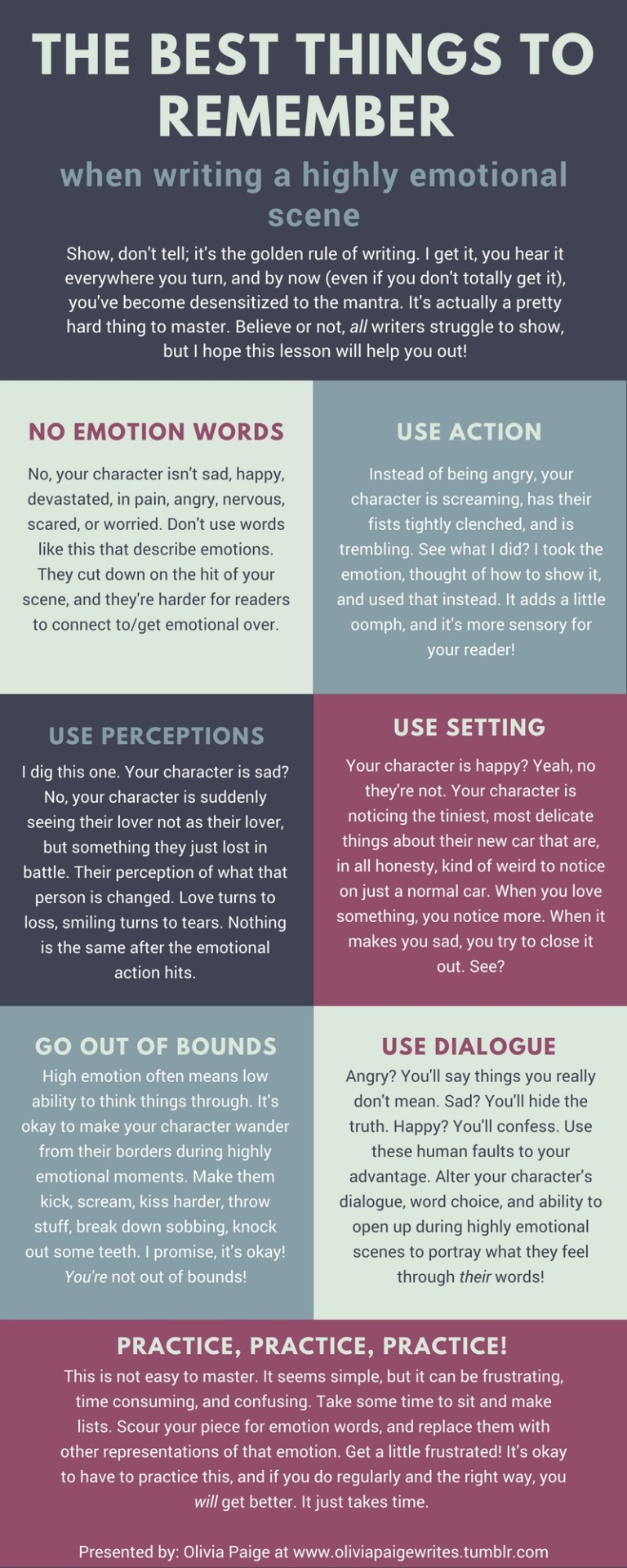
THIS IS AN IMPORTANT ONE! Don’t ignore this in your writing!
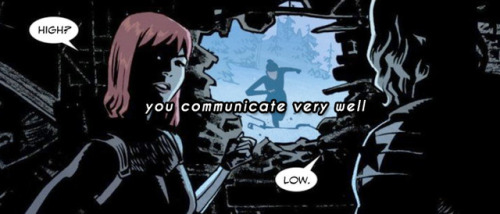


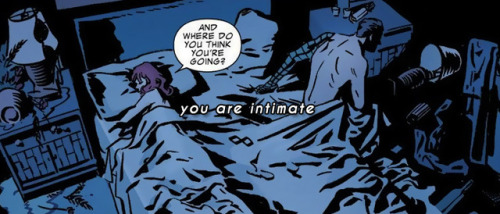


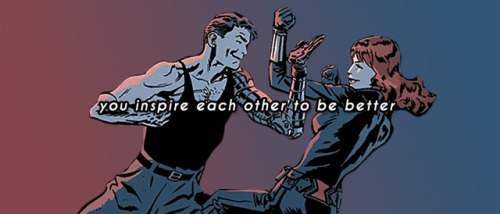

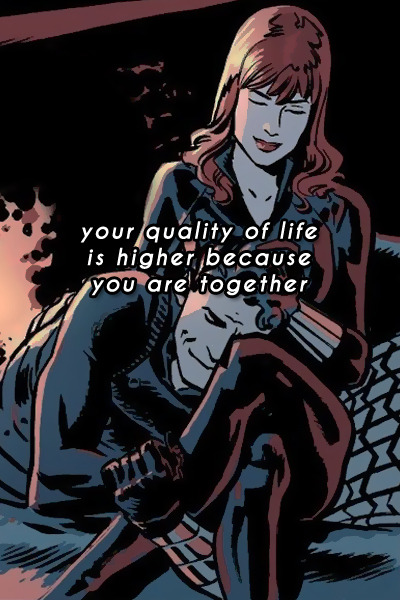
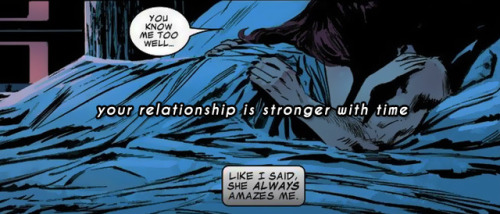
10 signs you’re in a healthy relationship (insp.)
for @natashkabarnes











Total pacifism. Do you really think such a world is possible?
Nonsexual acts of Intimacy - Select from the following for my muse to respond to...
♔ : Finding your muse wearing their clothes
♕: Holding hands
♖: Having their hair washed by your muse
♗: Your muse falling asleep with their head in my muse's lap.
♘: Cuddling in a blanket fort
♙: Sharing a bed
♚: Head scratches
♛: Sharing a dessert
♜: Shoulder rubs
♝: Reading a book together
♞: Caring for each other while ill (specify which party is which)
♟: Patching up a wound
♤: Taking a bath together
♧: Your muse playing with their hair
♡: Accidentally falling asleep together
♢: Forehead or cheek kisses
♠: Your muse adjusting their jewelry/neck tie/ etc.
♣: Back scratches
♥: Your muse crying about something
♦: Slow dancing
Domestic OTP story starters:
1. "It's a pillow fort made out of blankets."
2. "Tampons? You want me to buy tampons?"
3. "Cough into your elbow like a civilized human being."
4. *sleepy snuggles when neither one wants to get out of bed in the morning*
5. "It's not burnt. It's slightly toasted."
6. "Get out before I suffocate you with hairspray."
7. "Your dad doesn't like me, and he owns guns..."
8. "Get over yourself. It's connect-four."
9. "What do you mean you cut yourself doing dishes? You never do the dishes?"
10. "I don't care if I'm allergic, I bought him and we're keeping him."
11. "Frozen pizza...why don't you just give me dog food?"
12. "FIX THE INTERNET BEFORE I SMASH THIS COMPUTER"
Sentence Prompts
“Are you even listening to me?”
“Where are your pants?”
“I laugh because I hurt inside.”
“Please refrain from shooting her, we need her for later.”
“You look like an open autopsy.”
“That’s french for ‘go away’.“
“You know, I would help, but making fun of you is so much more satisfying.”
“No, you silly goose, it’s magic!”
“Put me down!”
“How much did someone pay you to wear that?!”
“What did you just do?!”
“Stop filming me, moron!”
“It was all me, by the way.”
“Look at this, ACTION ROLL! They’ll never see it coming!”
“You know ‘give me a warning’ means let me know BEFORE they come in here!”
“I’d say I’m sorry, but I’m not.”
“I may have mildly panicked…”
“Ooo, that must’ve hurt!”
“I am very, very bad under pressure!”
“Shut up, it’s fine, just chill, we’re fine, I’m fine, everything is cool, everything is good! We’re chill, nothing is happening and I am not freaking out, not at all, we’re FINE.””
“Now, not to be forward, but I love you.”
“I’m 72 different flavors of done with you.”
“Hey, on the ground there it says you’re a gullible shit.”
“It’s do or die, most likely die.”
“No it’s ‘Protect and Serve’ not ‘Get Rekt and Swerve’.”
“You make me smile.”
“Liam Neeson would do it.”
“Jail can’t stop me.”
“It’s four o'clock, don’t you think you should fuck off?”
“I remain confused.”
“As the wise Scooby Doo said; “Ruh Roh”.”
“I don’t know about you guys, but I feel fabulous.”
“Can someone shoot him?”
“Well this isn’t at all like High School Musical.“
“Quick, blend in!”
“At the moment, it seemed like a good plan, obviously it was not.”
“Well obviously nothing is going on here!”
“Can I help you?”
“Don’t be intimidated by my bloody and battered figure.”
“Is your name Bob? You look like a Bob.”
“KILL ME! KILL ME IN THE EYES!”
“Well that was unsettling.”
“Don’t judge me, but I may have murdered someone.”
“Why is there a picture of Steve Buscemi in your bathroom?!”
“My budget is 5 dollars, what are your recommendations?”





Relena.




someone reblogged this gifset from The Martian and my mind just went where it always does.










Gundam Wing Pilots: First and Last appearances



Here’s an original epilogue of Frozen Teardrop from Asagi Sakura art book.
This is a summary I made when I read this for the first time. There are some points or details that I skipped and didn’t mention it in the summary. My Japanese skill isn’t good and I’ve never translated anything into English, so if there’s any mistakes in this summary, please tell me and I will fix it. :)
Epilogue: 静寂の終曲 (Finale of Silence)
- Heero proposed to Relena in spring of MC0023 (the end of novel vol.13) and they lived together on Mars, in the lakeside house with flower garden. In this epilogue, it was summer of the same year. They were married for 5 months.
- They didn’t sign the marriage license because Heero didn’t have ID no. (Lol) but that was fine to them.
- Relena still kept calling Heero “Heero”. He wanted to change his name but he had no idea (He didn’t want to use “Aiden” or “Clark” or “Beta”) so Relena decided to call him the same.
- In epilogue, they were having afternoon tea together after Heero tended their garden (how cute)
- After the tea, Heero showed his birth certificate with his mother’s name “Aoi” on it to Relena. The father’s name on the document was blank. He told her that he could use this to register for ID no. and then they can sign on their marriage license to become (real/legally) husband and wife. Heero also said that when they have their own children, he didn’t want the father name was blank. (Awwwwww) That made Relena blushed and she was very happy.
- Relena and Heero came to see the white rose iceberg that she planted by herself. She told him that the flower language of white rose is purity/innocence and mutual love. And the another name of iceberg is “Snow white” (same as the name of his gundam)
- When he saw the rose garden, Heero was surprised that he felt the tear in his eyes because he thought that his tear was frozen all along.
- Here’s the last scene’s conversation:
Heero : This is wonderful. This rose garden is the most beautiful place in Mars.
Relena : Eh?, then tell me where is the most beautiful place in space?
Heero : ….I can’t.
Relena : Why?
Heero : I’ve never looked all around the space, so I don’t want to lie to you.
(Relena thought that it’s ok if he lie for once)
Relena : Heero, you are so mean….
Heero : Relena who still keep calling me “Heero” is mean.
In the garden with sunset, their silhouettes were together forever.
END.
That’s the end of the long journey. After all these 20 years. Congratulations, Heero and Relena (and 1XR shippers)

anyway i started making a map from this
Enlisted Ranks: Army
There’s nothing I hate more than a story that didn’t even try to get its ranks right. Why is a major giving orders to a colonel? Why is a first sergeant working with a bunch of fuzzies? Why the hell did you just call the sergeant major ‘sir’?
Military ranks are different across the branches, but if your story features the U.S. Army, here’s a breakdown of enlisted ranks and rank etiquette. (other branches coming soon!)
Basics Ranks in the army follow a numerical pattern, so if you’re ever not quite sure what the name of the rank higher is, you can reference them by nomenclature. E-series: E stands for enlisted. This refers to soldiers from private to sergeant major. O-series: O stands for officer. This refers to soldiers from second lieutenant to general. O-series post coming soon! W-series: W stands for warrant officer. This refers to soldiers from warrant officer 1 to chief warrant officer 5. W-series post coming soon! In ACUs, (army combat uniform) the rank is worn in the center of the chest via a velcro patch. In class-A uniforms, the rank is worn on the shoulder. Each pay grade earns slightly more per month than the one before it. Officers make significantly more money per month than enlisted. Time in service also affects pay, meaning a sergeant who’s been in six years will make more than a staff sergeant who’s been in three years.
E-1: Private Most people who enlist come in at E-1 unless they were in JROTC, have a college degree, or performed some other feat with their recruiters prior to enlisting i.e. volunteer work, good P.T. scores, etc. This is the lowest pay grade and has no rank. Soldiers who are E-1s do not wear a rank. also known as: PV1, fuzzy (because they wear no velcro rank, there’s a patch of bare fuzz in the middle of their uniform. You can buy a patch to cover it.) Title: Private, PV1 E-2: Private Yes, there are two ranks by the name of private. You reach E-2 automatically after six months of enlistment. If you enroll in the Delayed Entry Program or have an acceptable P.T. card with your recruiter, you can enlist as an E-2 instead of an E-1. At E-2, you more or less have no more power than an E-1. also known as : PV2 Title: Private, PV2
E-3: Private First Class The final “private” class. You reach E-3 automatically after 12 months of enlistment, assuming you’ve been an E-2 for at least four months. If you were in JROTC for four years, you enter automatically at this rank. This rank still doesn’t have much power, but may be put in charge of other privates and may assist their team leader with tasks, and on occasion may be a team leader themselves. also known as : PFC Title: Private, PFC. E-4: Specialist/Corporal The last “junior enlisted” class. You reach specialist automatically after 24 months of enlistment, assuming you’ve been a PFC for at least six months. If you enlist with a completed four year college degree, you can start out as an E-4 instead of an E-1. Specialists tend to be team leaders and may be in charge of other specialists and privates. When no NCOs are present, the senior specialist is in charge.
Corporal, while technically the same pay grade as specialist, is actually an essentially higher rank. It’s a special rank only bestowed on those who are in leadership positions and are awaiting the appropriate time in service/time in grade to be promoted to sergeant. Corporals are considered NCOs while specialists are considered junior enlisted. Strictly speaking corporals and specialists are the same rank, but in most situations, corporals out rank specialists. also known as: shamshields, (specialist only) SPC, CPL Title: Specialist, Corporal —
Intermission!
Man, all of that text is boring. Let’s break it up a bit with some rank etiquette, shall we?
• Lower enlisted (E-1 thru E-4) tend to call each other by their surname regardless of rank. Even an E-1 will probably be calling a specialist just by their name. The exception is Corporals, who are considered NCOs and are referred to by rank.
• E-5 and above are referred to as “NCOs,” or non-commissioned officers.
• NCOs with similar ranks might call each other by their surnames and will call lower enlisted by their surnames. When discussing another NCO with a lower enlisted, they will use that NCO’s proper rank. So a sergeant speaking to a PFC will say “Sergeant Smith needs you,” not “Smith needs you.” Freshly promoted sergeants who still hang out with lower enlisted might not mind their friends calling them their surnames in private, but formally and professionally they’re expected to address their senior properly.
• Lower enlisted ranks are often called “joes,” especially when an NCO is addressing another NCO about their squad or platoon. “Have your joes had chow yet?” = “Have the soldiers directly under your command eaten yet?”
• It’s considered inappropriate for lower enlisted to hang out with NCOs and it’s discouraged, especially in the work place.
Are you all rested up? Great! Let’s get back to the ranks.
—
E-5: Sergeant
Finally: the NCO ranks! Unlike the previous ranks, you cannot automatically rank up to sergeant. You must attend special courses and be seen by a promotion board where you’ll be expected to recite the NCO creed and have knowledge appropriate for an non-commissioned officer. From this rank on, lower-ranked soldiers will refer to you as “sergeant” and you will likely be a squad leader or in another leadership position.
• Lower enlisted do NOT refer to sergeants by their surname unless it is paired with their rank. “Sergeant Smith,” not just “Smith,” or your private will be doing a lot of push-ups.
• No one calls them “Sarge.” Like… just don’t do it friends.
• Some pronounce sergeant in such a way it sounds as though the g is dropped entirely. Ser-eant, or phonetically, “saarnt.”
also known as: SGT
Title: Sergeant
E-6: Staff Sergeant
Sergeant Plus. You probably will have similar responsibilities to an E-5, meaning probably a squad leader unless you need to fill in for a platoon sergeant. Don’t misunderstand; in lower enlisted ranks, private and private first class aren’t that much of a difference. E-5 and E-6 are a definite difference though. It is acceptable to call an E-6 either “sergeant” or “sergeant (name)” instead of staff sergeant.
also known as: SSG
Title: Sergeant
E-7: Sergeant First Class
At this point the ranks become known as “senior NCO.” E-7 and above cannot be demoted by normal means. It actually requires a court martial or congressional approval to demote an E-7. Like, it’s surprisingly hard to demote people after this point. I once knew an E-7 who got busted with a DUI and STILL didn’t lose his rank.
Anyway, it’s still appropriate to call an E-7 “sergeant” or “sergeant (name)” instead of sergeant first class. SFCs may be platoon sergeants or in some circumstances may hold a first sergeant position. While positioned as a first sergeant, they should be referred to as “first sergeant.” Unless you work at battalion level or higher, this is probably the highest NCO rank you’ll interact with regularly, and in some cases interacting with an E-7 can be as big a deal as interacting with an E-8.
also known as: SFC
Title: Sergeant
E-8: First Sergeant/Master Sergeant
Another dual-rank. First sergeants are the NCO in charge of a company and are usually the highest ranking NCO soldiers will interact with regularly. They run the company alongside the company commander. All NCOs answer to them and most beginning of the day and end of the day formations will be initiated and ended with them. It is only appropriate to refer to a first sergeant as “first sergeant” or “first sergeant (name).” Do not just call them “sergeant.”
Master sergeants are E-8s who are not in a first sergeant position. Typically these people wind up working in offices in battalion or brigade. It’s only appropriate to refer to a master sergeant as “master sergeant” or “master sergeant (name).”
also known as: 1SG, FSG, (first sergeant only) MSG (master sergeant only)
Titles: First Sergeant, Master Sergeant.
E-9: Sergeant Major or Command Sergeant Major
We finally reach the end of the list: Sergeant Major, the highest ranking NCO. Sergeant Majors will be found at battalion level and higher. Command Sergeant Majors are those that hold a leadership position in a battalion, brigade, etc, like first sergeant vs master sergeant. It is appropriate to refer to E-9s as “sergeant major” or “sergeant major (name).” Typically, a command sergeant major will be referred to AS command sergeant major.
In the U.S., the plural form of sergeant major is “sergeants major.” Outside the U.S., “sergeant majors” can be correct.
also known as: SGM, CSM
Title: Sergeant Major
Now, for the most important announcement:
Soldiers NEVER, and I mean NEVER, refer to an NCO as “sir” or “ma’am.” Forget what the movies tell you; if your first sergeant is chewing you out, you do not say “ma’am, yes ma’am!” You’ll earn yourself some push-ups and some cleaning duty and probably a counseling. Do you see how under every rank I’ve provided a “title” section? That’s how your soldiers address that rank. Period. The only people who get called “sir” and “ma’am” are civilians and officers. Cannot tell you how many movies I’ve rolled my eyes into my skull because some snot-nosed private is calling their squad leader “sir.” Please cease this immediately. Thank you.
That’s all for scriptsoldier’s rank breakdown of enlisted ranks! Stay tuned for our breakdown of officers, warrant officers, and how your rank affects your standing in your unit!
Words to replace said, except this actually helps
I got pretty fed up with looking for words to replace said because they weren’t sorted in a way I could easily use/find them for the right time. So I did some myself.
IN RESPONSE TO Acknowledged Answered Protested
INPUT/JOIN CONVERSATION/ASK Added Implored Inquired Insisted Proposed Queried Questioned Recommended Testified
GUILTY/RELUCTANCE/SORRY Admitted Apologized Conceded Confessed Professed
FOR SOMEONE ELSE Advised Criticized Suggested
JUST CHECKING Affirmed Agreed Alleged Confirmed
LOUD Announced Chanted Crowed
LEWD/CUTE/SECRET SPY FEEL Appealed Disclosed Moaned
ANGRY FUCK OFF MATE WANNA FIGHT Argued Barked Challenged Cursed Fumed Growled Hissed Roared Swore
SMARTASS Articulated Asserted Assured Avowed Claimed Commanded Cross-examined Demanded Digressed Directed Foretold Instructed Interrupted Predicted Proclaimed Quoted Theorized
ASSHOLE Bellowed Boasted Bragged
NERVOUS TRAINWRECK Babbled Bawled Mumbled Sputtered Stammered Stuttered
SUAVE MOTHERFUCKER Bargained Divulged Disclosed Exhorted
FIRST OFF Began
LASTLY Concluded Concurred
WEAK PUSY Begged Blurted Complained Cried Faltered Fretted
HAPPY/LOL Cajoled Exclaimed Gushed Jested Joked Laughed
WEIRDLY HAPPY/EXCITED Extolled Jabbered Raved
BRUH, CHILL Cautioned Warned
ACTUALLY, YOU’RE WRONG Chided Contended Corrected Countered Debated Elaborated Objected Ranted Retorted
CHILL SAVAGE Commented Continued Observed Surmised
LISTEN BUDDY Enunciated Explained Elaborated Hinted Implied Lectured Reiterated Recited Reminded Stressed
BRUH I NEED U AND U NEED ME Confided Offered Urged
FINE Consented Decided
TOO EMO FULL OF EMOTIONS Croaked Lamented Pledged Sobbed Sympathized Wailed Whimpered
JUST SAYING Declared Decreed Mentioned Noted Pointed out Postulated Speculated Stated Told Vouched
WASN’T ME Denied Lied
EVIL SMARTASS Dictated Equivocated Ordered Reprimanded Threatened
BORED Droned Sighed
SHHHH IT’S QUIET TIME Echoed Mumbled Murmured Muttered Uttered Whispered
DRAMA QUEEN Exaggerated Panted Pleaded Prayed Preached
OH SHIT Gasped Marveled Screamed Screeched Shouted Shrieked Yelped Yelled
ANNOYED Grumbled Grunted Jeered Quipped Scolded Snapped Snarled Sneered
ANNOYING Nagged
I DON’T REALLY CARE BUT WHATEVER Guessed Ventured
I’M DRUNK OR JUST BEING WEIRDLY EXPRESSIVE FOR A POINT/SARCASM Hooted Howled Yowled
I WONDER Pondered Voiced Wondered
OH, YEAH, WHOOPS Recalled Recited Remembered
SURPRISE BITCH Revealed
IT SEEMS FAKE BUT OKAY/HA ACTUALLY FUNNY BUT I DON’T WANT TO LAUGH OUT LOUD Scoffed Snickered Snorted
BITCHY Tattled Taunted Teased
Helpful things for action writers to remember
Sticking a landing will royally fuck up your joints and possibly shatter your ankles, depending on how high you’re jumping/falling from. There’s a very good reason free-runners dive and roll.
Hand-to-hand fights usually only last a matter of seconds, sometimes a few minutes. It’s exhausting work and unless you have a lot of training and history with hand-to-hand combat, you’re going to tire out really fast.
Arrows are very effective and you can’t just yank them out without doing a lot of damage. Most of the time the head of the arrow will break off inside the body if you try pulling it out, and arrows are built to pierce deep. An arrow wound demands medical attention.
Throwing your opponent across the room is really not all that smart. You’re giving them the chance to get up and run away. Unless you’re trying to put distance between you so you can shoot them or something, don’t throw them.
Everyone has something called a “flinch response” when they fight. This is pretty much the brain’s way of telling you “get the fuck out of here or we’re gonna die.” Experienced fighters have trained to suppress this. Think about how long your character has been fighting. A character in a fist fight for the first time is going to take a few hits before their survival instinct kicks in and they start hitting back. A character in a fist fight for the eighth time that week is going to respond a little differently.
ADRENALINE WORKS AGAINST YOU WHEN YOU FIGHT. THIS IS IMPORTANT. A lot of times people think that adrenaline will kick in and give you some badass fighting skills, but it’s actually the opposite. Adrenaline is what tires you out in a battle and it also affects the fighter’s efficacy - meaning it makes them shaky and inaccurate, and overall they lose about 60% of their fighting skill because their brain is focusing on not dying. Adrenaline keeps you alive, it doesn’t give you the skill to pull off a perfect roundhouse kick to the opponent’s face.
Swords WILL bend or break if you hit something hard enough. They also dull easily and take a lot of maintenance. In reality, someone who fights with a sword would have to have to repair or replace it constantly.
Fights get messy. There’s blood and sweat everywhere, and that will make it hard to hold your weapon or get a good grip on someone.
A serious battle also smells horrible. There’s lots of sweat, but also the smell of urine and feces. After someone dies, their bowels and bladder empty. There might also be some questionable things on the ground which can be very psychologically traumatizing. Remember to think about all of the character’s senses when they’re in a fight. Everything WILL affect them in some way.
If your sword is sharpened down to a fine edge, the rest of the blade can’t go through the cut you make. You’ll just end up putting a tiny, shallow scratch in the surface of whatever you strike, and you could probably break your sword.
ARCHERS ARE STRONG TOO. Have you ever drawn a bow? It takes a lot of strength, especially when you’re shooting a bow with a higher draw weight. Draw weight basically means “the amount of force you have to use to pull this sucker back enough to fire it.” To give you an idea of how that works, here’s a helpful link to tell you about finding bow sizes and draw weights for your characters. (CLICK ME)
If an archer has to use a bow they’re not used to, it will probably throw them off a little until they’ve done a few practice shots with it and figured out its draw weight and stability.
People bleed. If they get punched in the face, they’ll probably get a bloody nose. If they get stabbed or cut somehow, they’ll bleed accordingly. And if they’ve been fighting for a while, they’ve got a LOT of blood rushing around to provide them with oxygen. They’re going to bleed a lot.
Here’s a link to a chart to show you how much blood a person can lose without dying. (CLICK ME)
If you want a more in-depth medical chart, try this one. (CLICK ME)
Hopefully this helps someone out there. If you reblog, feel free to add more tips for writers or correct anything I’ve gotten wrong here.

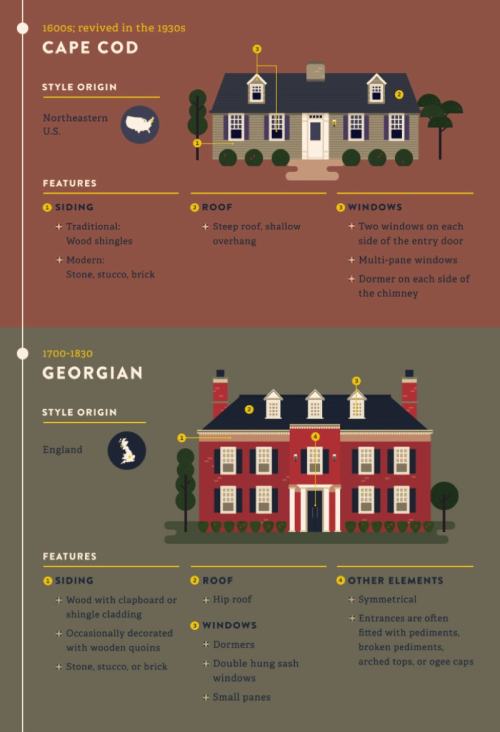



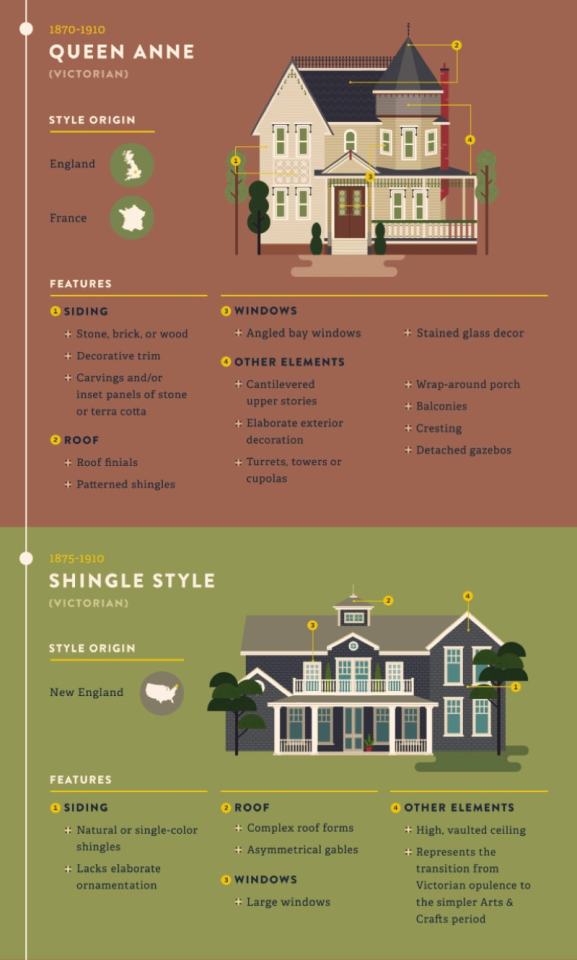


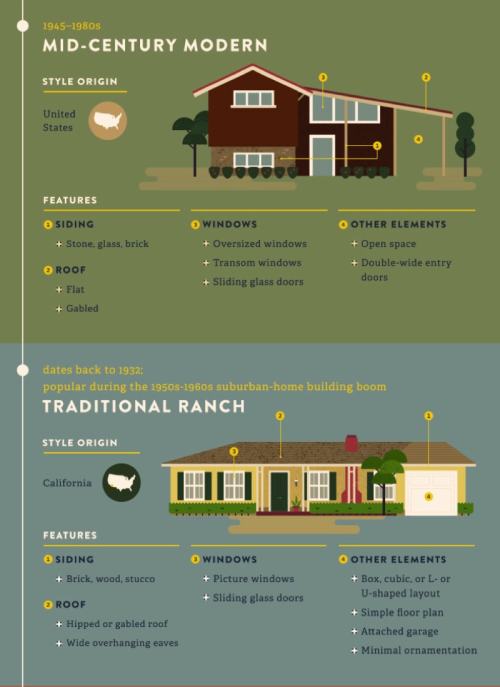


Reference and inspiration for building homes. Original source here.



“ Live Alone2 ” GUNDAM WING Doujinshi Produced by Plum Garden Pairing * Heero x Relena
Duo: [in a crowd and cant find Heero] this calls for drastic measures.
Duo: [uses his hands as a microphone] RELENA PEACERAFT HAS BEEN KIDNAPPED BY THE MILITIA!
Heero: [from across the street] I'M FUCKING GONNA GO SAVE HER
Duo: there he is









Gundam Wing: Endless Waltz
ESUN Vice Foreign Minister Relena Darlian, former Queen of the World

NASA scientists have reported that they’ve successfully tested an engine called the electromagnetic propulsion drive, or the EM Drive, in a vacuum that replicates space. The EM Drive experimental system could take humans to Mars in just 70 days without the need for rocket fuel, and it’s no exaggeration to say that this could change everything.
But before we get too excited (who are we kidding, we’re already freaking out), it’s important to note that these results haven’t been replicated or verified by peer review, so there’s a chance there’s been some kind of error. But so far, despite a thorough attempt to poke holes in the results, the engine seems to hold up.
Continue Reading.